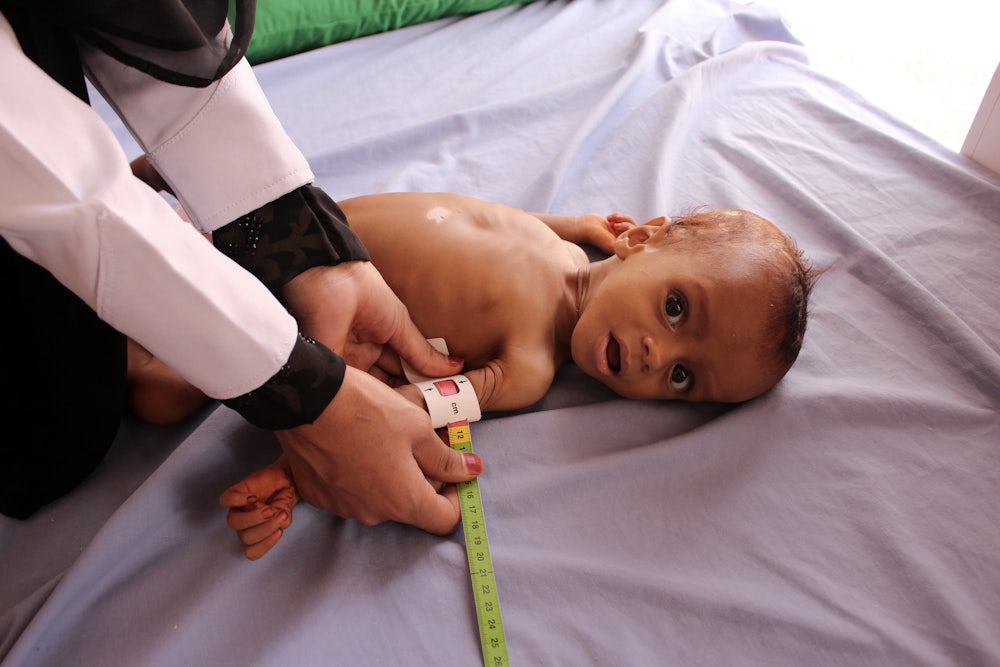When I asked Moosa Elayah to describe where he was born—a province in Yemen called Ibb—the first thing he said was “green,” which makes sense. Ibb, in the southwestern corner of the country, is the wettest place in the entire Arabian Peninsula. It’s also a rare source of viable land for growing food and storing water in an otherwise dry, dusty country—one now facing a catastrophic, war-fueled famine.
But Ibb isn’t the same place it used to be, said Elayah, now a senior scientist at the Netherlands-based Centre for International Development Issues. “It was very green. Now it’s almost all stone,” he told me on Friday. Farmland has been replaced by buildings—many of which now hold starving Yemenis who have fled the civil war in the north. More than a quarter of Yemen’s two million internally displaced persons, or IDPs, have found refuge in Ibb, according to the World Health Organization.
Ibb may be Yemen’s most fertile ground, but its IDPs are still starving, WHO reports. This probably would have been the case even without a civil war. Yemen has never had enough arable land (less than 3 percent) to support its population (28 million people). Its population is starving today not because food can’t grow there, but because of a long-standing economic crisis exacerbated by the three-year war.
“Both sides are using food as a weapon of war, but the crisis is caused primarily by a brutal air, land and sea blockade imposed by a Saudi Arabia-led coalition,” according to CNN, which added that the blockade “has cut the amount of desperately needed food, medicine and fuel getting into the country by more than half, according to aid groups.”
But Yemen’s ability to grow its own food and access its own clean water is also decreasing as the number of starving people grows. This is due to a number of factors, including climate change. “It is not that climate change itself is causing the [hunger] crises,” said Elayah, who wrote a paper on the subject last year. “It is that climate change is increasing the suffering of the people.”
As The Guardian explained last year, “Although remote rural areas are able to grow corn and other basic crops during the rainy season, climate change has had an impact on their ability to survive during conflict. In the past, villages would store enough food to last for three or four months in times of emergency. In recent years less rainfall, resulting in reduced harvests, means little if any food is stored for periods of crisis.”
Drought has also contributed to water scarcity, which, Elayah argues, is driving conflict. “The civil war in Yemen seems to be a politically-motivated competition for power among many actors with varying motives,” he wrote in his paper. “But underlying all other motives is the ongoing need by all parties to secure access to the diminishing water supply.”
The idea that climate change is an exacerbating factor of conflict—such as the war in Syria—isn’t new. “The countries suffering from wars and conflicts are the same countries who are also struggling from problems of climate change,” Elayah said. That the effects of climate change have partly caused these wars, however, is still a controversial theory within the scientific community.
But it’s more widely accepted that climate change compounds suffering during conflicts. In Yemen, people have been warning about its effects for almost a decade, well before the civil war began.
“Possible climate change impacts, such as more violent and less predictable rainfall and a hotter and possibly drier climate,” a 2010 World Bank report read, “would place Yemen’s people and economy under further stress.” Four years later, the organization warned again that the region would “get hotter and drier” if warming trends continued. This would cause shorter growing seasons, which “could threaten food security and competition for dwindling natural resources could fuel conflict.”
War and corruption and overuse of resources are the primary reasons for suffering in Yemen. But because climate change makes conditions worse, Elayah argues, the countries who primarily caused those changes have a duty to step in and help. “This problem will continue influencing the country in different ways,” he said. “The international community should have the responsibility to protect the civilians in Yemen from hunger.”
He specifically admonished the United States for pledging to abandon the Paris climate accord, and China, a major trading partner of Yemen, for offering help mostly in the form of loans to support economic development. “It should be their responsibility to protect the poorer nations, the people who are suffering from the problem they caused,” he said. “The people in Yemen don’t have any means. They are dying of hunger every day.”
